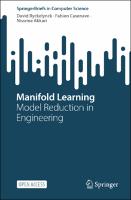Manifold Learning
Model Reduction in Engineering
Author(s)
Ryckelynck, David
Casenave, Fabien
Akkari, Nissrine
Language
EnglishAbstract
This Open Access book reviews recent theoretical and numerical developments in nonlinear model order reduction in continuum mechanics, being addressed to Master and PhD students, as well as to researchers, lecturers and instructors. The aim of the authors is to provide tools for a better understanding and implement reduced order models by using: physics-based models, synthetic data forecast by these models, experimental data and deep learning algorithms. The book involves a survey of key methods of model order reduction applied to model-based engineering and digital twining, by learning linear or nonlinear latent spaces. Projection-based reduced order models are the projection of mechanical equations on a latent space that have been learnt from both synthetic data and experimental data. Various descriptions and representations of structured data for model reduction are presented in the applications and survey chapters. Image-based digital twins are developed in a reduced setting. Reduced order models of as-manufactured components predict the mechanical effects of shape variations. A similar workflow is extended to multiphysics or coupled problems, with high dimensional input fields. Practical techniques are proposed for data augmentation and also for hyper-reduction, which is a key point to speed up projection-based model order reduction of finite element models. The book gives access to python libraries available on gitlab.com, which have been developed as part of the research program [FUI-25] MORDICUS funded by the French government. Similarly to deep learning for computer vision, deep learning for model order reduction circumvents the need to design parametric problems prior reducing models. Such an approach is highly relevant for image-base modelling or multiphysics modelling.
Keywords
Computational Mechanics; Data Augmentation; Deep Learning; Digital Twining; Dimensionality Reduction; GenericROM Library; High-Fidelity Model; Hyper-reduction; Image-based Digital Twins; Manifold Learning; Model Order Reduction; Mordicus; Multiphysics ModelingDOI
10.1007/978-3-031-52764-7ISBN
9783031527647, 9783031527630, 9783031527647Publisher
Springer NaturePublisher website
https://www.springernature.com/gp/products/booksPublication date and place
Cham, 2024Imprint
Springer Nature SwitzerlandSeries
SpringerBriefs in Computer Science,Classification
Machine learning
Mathematical and statistical software
Probability and statistics
Engineering thermodynamics
Production and industrial engineering
Mathematical physics


 Download
Download Web Shop
Web Shop